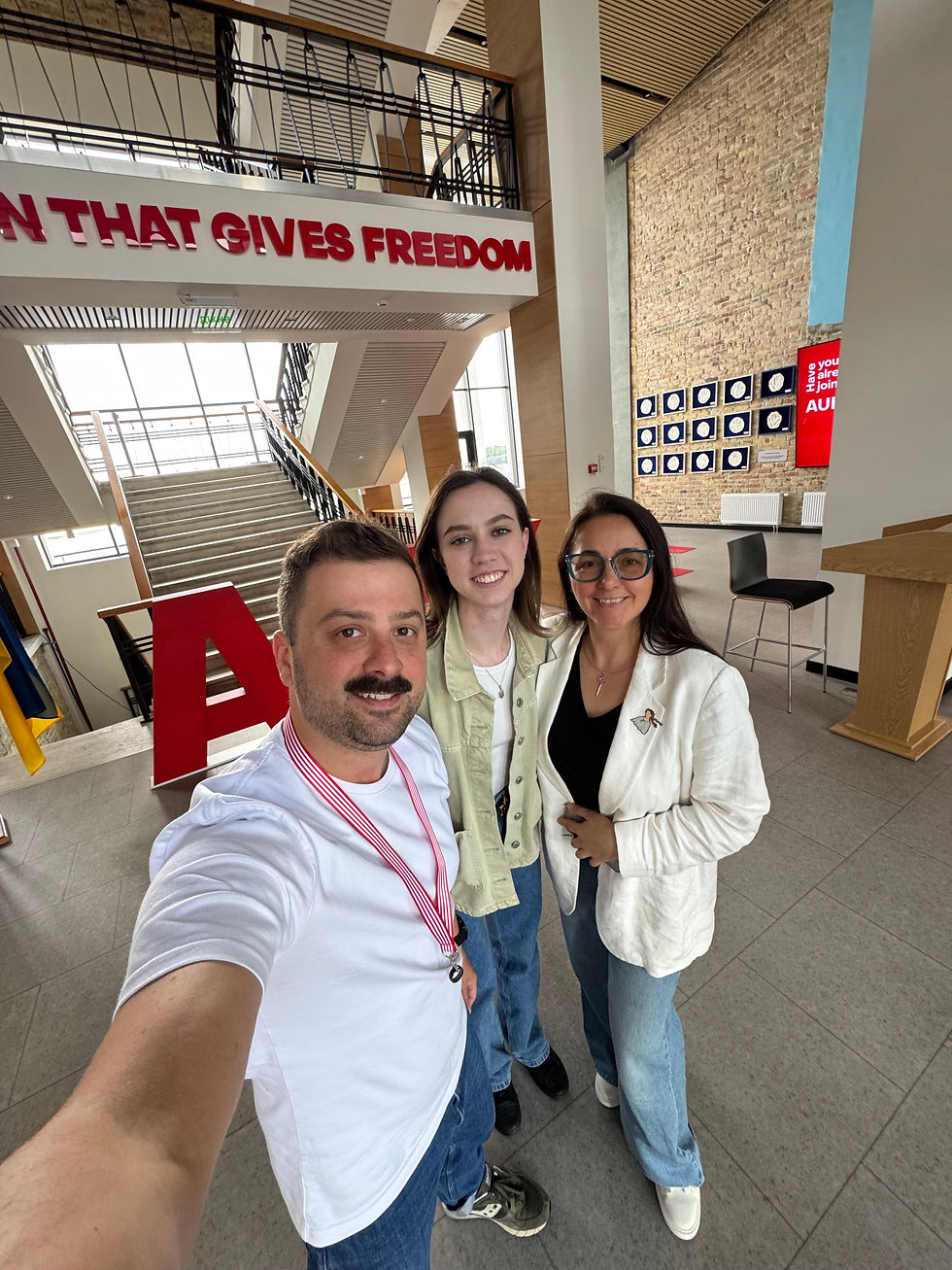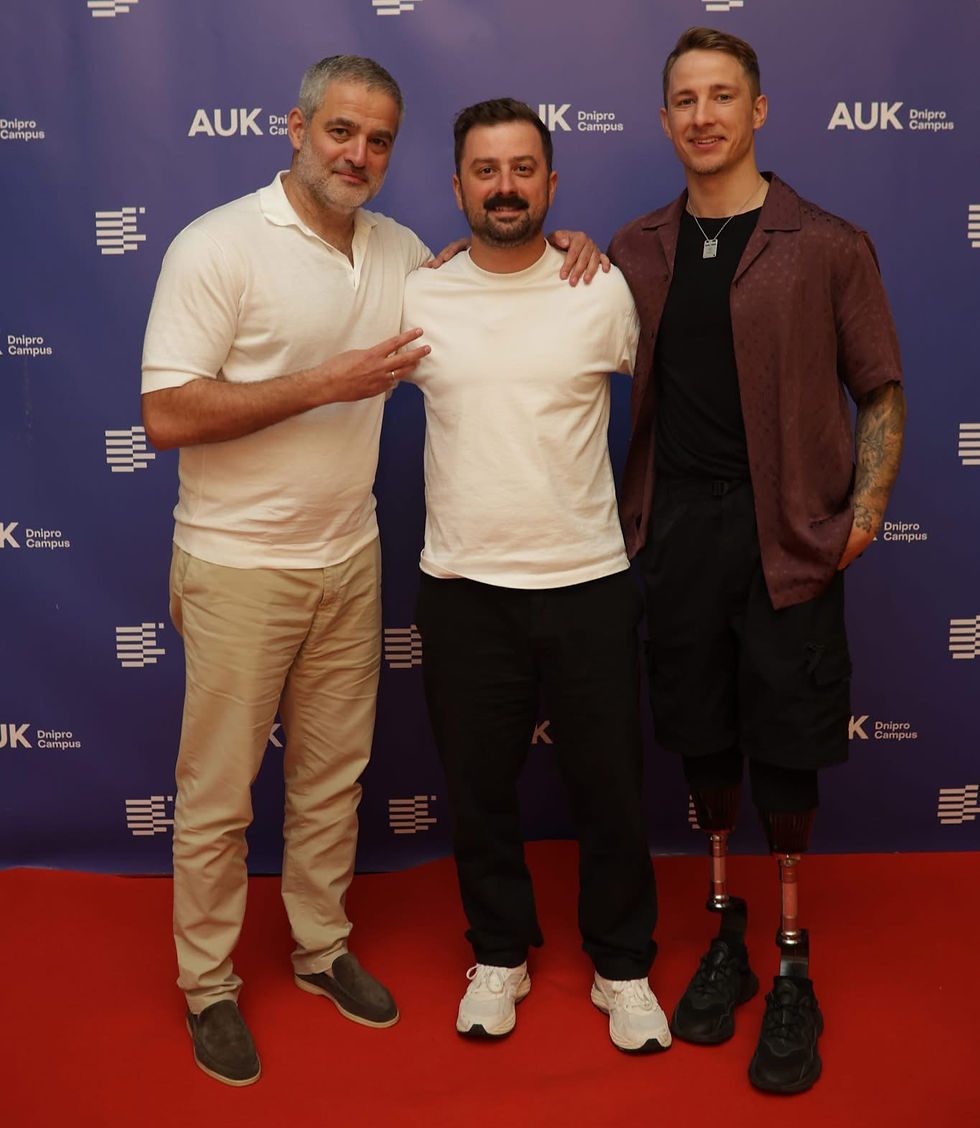I dwell in education, and education dwells in me
- Jul 20, 2025
- 7 min read

An interesting period to sum up interim results and share impressions, since the field of education is quite new to me. My reflections may be useful to those who want to try something new — without necessarily abandoning their previous experience or excluding the possibility of returning to it. In general, 100 days in management are considered quite indicative for projecting the future, so both failures and achievements will be mentioned in this post.
I WASN'T LOOKING FOR NEW DIRECTIONS. THEY FOUNT ME
Indeed, I had no goal to radically change my activity. With 15 years of experience in sales and team management, mostly in the construction field, I still consider it one of the most promising sectors in our country. Reconstruction or quality construction was in demand even before February 24, 2022 — and even more so after the full-scale invasion. At the same time, I always tried not to close myself off from other directions. That’s because functionally my work has been related to managing people and processes, communication, building partnerships, creating and adjusting systems. Therefore, the skills and experience gained in this activity can likely be applied in almost any organization. The main task is to be ready to learn new markets, new products, new chains of interaction, and new decision-making principles (from partners and colleagues to clients).
While studying at AUK, I understood that beyond gaining new knowledge — which I consistently crave — I was also gaining interaction and engagement in a community. It was the internal communication, joint work on projects in specific courses, and my proactive stance that brought me into the university in a managerial role. I’m incredibly grateful for the trust and believe it will only grow stronger.
MANAGEMENT IS MANAGEMENT EVERYWHERE
I already mentioned this a bit above, but I’ll try to summarize it here. Any organization is a community of various professionals united by at least shared values and voluntarily directing their efforts toward achieving common goals and fulfilling the mission of the community (quite a decent definition, I think). Products, goals, industries may differ, but the main added value of teamwork, in my opinion, lies in effectively organizing that interaction. I'm not saying the professionalism of individual specialists doesn’t matter. On the contrary — when we talk about tailored markets or products where uniqueness, scarcity, and exclusivity are the core of the value proposition, having specialists in specific, often narrow, crafts is crucial. However, when we talk about more mass industries targeting wide audiences, I believe team collaboration is much more valuable. Here it’s about scale and reach — about everything where the effective work of two people should be seen as 1+1 > 2. That’s exactly where management begins in all its forms: team organization, reporting, project management (an area where one can improve endlessly), communication, etc.

With sufficient experience in management behind me, I simply began applying familiar approaches in the educational sphere. And let me tell you — they work here too. Of course, there are some nuances and adjustments that need to be made, but generally speaking: management is management everywhere.
EDUCATION AND PERSPECTIVES
I could write volumes of reflections on this topic, as during these 114 days I’ve thought a lot about my educational path, about the reasons behind the difficult situation in Ukraine’s educational environment, and about the transformation of education as a whole with the rise of AI. To avoid turning this into an “ultra long read,” I’ll stop at a few theses, strictly personal and not claiming to be the only correct views.
Education in Ukraine (mostly vocational and higher) has undergone destructive transformations for many years. I explain this process by our “glorious” Soviet legacy, which shaped most processes not from market needs but from available resources. Let’s make 20 million master’s degree holders! Never mind that a master's level means, essentially, a near-scientist, an inventor, an innovator in the respective field. What’s the result? Even for entry-level positions, candidates with master’s degrees are considered. Why? Are they going to invent something? Create new approaches in their field? No. It’s just that everyone who graduates must have a master’s degree. A bachelor’s is seen as somehow incomplete. And what about technical schools? They simply died out. Tech schools are viewed as for those who don’t want to study or aren’t smart enough (which I disagree with, by the way). In reality, technical schools are a powerful source of craftsmen — people who are professionals in their niche trade. But when hiring electricians, we primarily consider master's degree holders... The situation is changing slightly now, but not because of national-level support for vocational education — rather because large corporations are developing it themselves. Business doesn’t want to wait for someone to create technical schools for them — they invest in the process themselves.
As for higher education — it’s also not so simple. The main problem is a sort of chasm between universities and businesses (and the market as a whole). There’s a fairly stable track for every child: kindergarten – elementary school – high school – bachelor’s – master’s – CHASM – job. I personally know many people who went to university just for a diploma with the broadest possible specialization: finance, economics, analytics. Why? Because even in their fourth year, they had no clarity on where they could apply themselves. And when a representative from a state-owned company shows up at a guest lecture offering internships with pay lower than what you’d make giving guitar lessons, students aren’t exactly excited to join. Today, I and AUK are personally trying to bridge this chasm. By involving businesses in the creation of universities, forming faculties and schools, offering short upskilling and reskilling courses, our team is working not from resources (though we have powerful support from Arizona State University with its 950+ programs and 400+ faculties), but from market needs. This allows us to offer students cool internships in top companies in Ukraine and worldwide — and offer companies ready professionals for entry-level positions.
Referring back to the first point — education in Ukraine is very difficult to commercialize. Despite often low quality, applicants still expect it to be free. But a high-quality, valuable asset that always stays with you, that can’t be stolen or taken — cannot be free or cheap. The road to quality education that people see as an investment is long, but it still must be traveled. I want to express immense gratitude to all businesses that have the means and the understanding to support this. It is they who provide scholarships to our students. So, 200 grants for AUK Dnipro Campus or individual grants for Kyiv are not free education — it is education paid for, student by student, by specific businesses.
PEOPLE MAKE THE DIFFERENCE
Working at AUK, I realized that people — their values and alignment with yours — are the key to success. Toxicity, distrust, irresponsibility, authoritarianism — you can’t build an inspiring company or business on these. I’m glad none of these traits exist within the AUK team at any level. That’s incredibly uplifting, adds confidence, and encourages one to try, fail, correct mistakes, and try again.

As for our partners — that’s a whole story. The Inspira business community, which unites powerful regional companies, is not just involved in the AUK Dnipro Campus project, but its individual members actively participate in operations. I want to especially acknowledge the contribution of Borys Markov, a member of the ATB Board of Directors, and Mykola Demchenko, entrepreneur and co-founder of the community. Without these two gentlemen, it would’ve been extremely difficult for me (and the entire AUK project team). Moreover, I was genuinely impressed by the openness of business owners and top management of Ukraine’s strongest companies — their willingness to engage in an educational project that has no clear return timeline or ROI. It’s an honor for me to interact with such businesses and their representatives.



So yes, people — or rather, personalities — make the difference.
SUCCESSES AND FAILURES
In these 114 days, together with our team, partners, and donors, we’ve accomplished a lot. From building a communication process with all regional businesses, veteran communities and patronage services; to launching bi-monthly educational events; organizing the design and construction processes at the campus; forming academic programs with a retail business focus; and most importantly, establishing super active communication with our future students. Every month we held University Day events (twice a month in June and July), hosted business discussion panels, participated in events in other cities, and communicated actively with schools. I believe this work, despite the tendency of graduates to leave — in the best case from Dnipro, in the worst from Kyiv — will bear fruit. We cannot directly affect the military situation, but we can at least neutralize one factor — the availability of quality education at home.
We created the AUK Dnipro Campus Advisory board. An interesting story — this is exactly how I envisioned my long-term future: contributing to advisory boards where my experience and skills can be useful to various businesses and fields. In our case, this element of corporate governance aims to balance the university’s development vision and synchronize it with business needs. Companies involved in the Advisory board can directly influence and guide our efforts, focusing our attention on what truly matters. It’s important to remember: the consumer of education is the student, but the user of education is the business or organization. They are the ones applying employees’ knowledge and skills for their own development.


Reflecting on my actions, I realize we need to do more in engaging not just graduates but also 9th and 10th graders. We definitely could and should have done more. I have ideas and plans for this — and I will gradually share our progress and results.
CONCLUSION

I can’t say what tomorrow will bring. Strategic planning for years ahead has turned into one-year flexible planning in many companies. All I can say is that I feel I have the potential to be of use in the educational field. Graduate Yelyzaveta Okpokaro, who scored 200 out of 200 on three out of four NMT subjects, said at our final discussion panel that education gives a person the freedom to choose, to view the world broadly, to seek and to find oneself. So I can’t help but be proud of my involvement with AUK — because this is exactly how our slogan sounds: education that gives freedom.



Comments